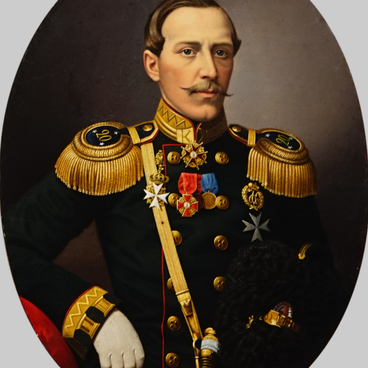All four legs of this chair, as well as its armrests and the arched back, are made of cow horns. The seat and a part of the back are upholstered in orange plush. Bits of fur still remain on the back of the chair and its legs. It is likely that the exhibit came to the museum from the Maryino estate in the Bronnitsy District sometime after the Revolution when the estate was nationalized.
At the end of the 18th century, the small village of Maryino, which nowadays belongs to the territory of the city of Bronnitsy not far from Moscow, was the property of Dormidont Khlopov. Then it passed to the FonvIzin family.
MikhaIl Fonvizin (1788–1854) distinguished himself in the Battle of Austerlitz at the age of seventeen. He was decorated with the Order of Saint Anna, 4th class. Fonvizin also fought in the Patriotic War of 1812. He battled in Dorogobush, Gzhatsk, and Borodino, where he earned the Order of Saint Anna, 2nd class. For his actions during the battle of Smolensk Fonvizin was awarded the Order of Saint Vladimir, 4th class, with a bow.
He served as an adjutant to Alexey Yermolov, the duty officer in the headquarters of the Russian army, who wrote about him as follows: ‘I know that he is a most brave officer and a very intelligent person who excelled in his studies. I know that he is also an extraordinary front-line soldier.’
As the opposing side advanced along the Ryazan road, Mikhail Fonvizin galloped to his father’s Maryino estate in order to warn the family of the enemy’s approach and help them evacuate. He returned to his duty station disguised in peasant clothes and managed to inform the Russian force that Moscow had been occupied by the enemy.
In October 1812, near Maloyaroslavets, he was awarded a gold sword with the words ‘For Bravery’ inscribed on it. On October 27, 1814, Fonvizin was taken prisoner in France while wounded but managed to escape after starting a riot.
He fought in many battles and was awarded an Order of Merit of the Prussian Crown, an Iron Cross, and a silver Medal Commemorating the Patriotic War of 1812.
After the war, Mikhail Fonvizin became a member of several secret societies. Even though he and his brother Ivan were not on the Senate Square during the 1825 Decembrist revolt, they, like all other Decembrists, were sent into exile. Ivan Alexandrovich, a retired colonel, was judged rather mildly. He was allowed to stay in the Maryino estate under police supervision.
However, Mikhail Alexandrovich himself was sentenced to hard labor and sent into exile in Siberia. His wife Natalya Dmitrievna Fonvizina, nee Apukhtina (1805–1869), went with him, leaving two children in Maryino in the care of her mother and Ivan Fonvizin.
Mikhail Alexandrovich was one of the first to be allowed to return from exile in Siberia. Having arrived in Maryino in 1853, he found that neither his sons nor his brother were alive anymore. Mikhail Fonvizin was granted permission to stay in his estate and raised two adopted children.
Mikhail had less than a year left to live after returning from hard labor. He was buried in the Bronnitsy, on Sobornaya Square.
At the end of the 18th century, the small village of Maryino, which nowadays belongs to the territory of the city of Bronnitsy not far from Moscow, was the property of Dormidont Khlopov. Then it passed to the FonvIzin family.
MikhaIl Fonvizin (1788–1854) distinguished himself in the Battle of Austerlitz at the age of seventeen. He was decorated with the Order of Saint Anna, 4th class. Fonvizin also fought in the Patriotic War of 1812. He battled in Dorogobush, Gzhatsk, and Borodino, where he earned the Order of Saint Anna, 2nd class. For his actions during the battle of Smolensk Fonvizin was awarded the Order of Saint Vladimir, 4th class, with a bow.
He served as an adjutant to Alexey Yermolov, the duty officer in the headquarters of the Russian army, who wrote about him as follows: ‘I know that he is a most brave officer and a very intelligent person who excelled in his studies. I know that he is also an extraordinary front-line soldier.’
As the opposing side advanced along the Ryazan road, Mikhail Fonvizin galloped to his father’s Maryino estate in order to warn the family of the enemy’s approach and help them evacuate. He returned to his duty station disguised in peasant clothes and managed to inform the Russian force that Moscow had been occupied by the enemy.
In October 1812, near Maloyaroslavets, he was awarded a gold sword with the words ‘For Bravery’ inscribed on it. On October 27, 1814, Fonvizin was taken prisoner in France while wounded but managed to escape after starting a riot.
He fought in many battles and was awarded an Order of Merit of the Prussian Crown, an Iron Cross, and a silver Medal Commemorating the Patriotic War of 1812.
After the war, Mikhail Fonvizin became a member of several secret societies. Even though he and his brother Ivan were not on the Senate Square during the 1825 Decembrist revolt, they, like all other Decembrists, were sent into exile. Ivan Alexandrovich, a retired colonel, was judged rather mildly. He was allowed to stay in the Maryino estate under police supervision.
However, Mikhail Alexandrovich himself was sentenced to hard labor and sent into exile in Siberia. His wife Natalya Dmitrievna Fonvizina, nee Apukhtina (1805–1869), went with him, leaving two children in Maryino in the care of her mother and Ivan Fonvizin.
Mikhail Alexandrovich was one of the first to be allowed to return from exile in Siberia. Having arrived in Maryino in 1853, he found that neither his sons nor his brother were alive anymore. Mikhail Fonvizin was granted permission to stay in his estate and raised two adopted children.
Mikhail had less than a year left to live after returning from hard labor. He was buried in the Bronnitsy, on Sobornaya Square.

